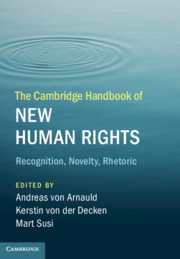Book contents
- The Cambridge Handbook of New Human Rights
- The Cambridge Handbook of New Human Rights
- Copyright page
- Contents
- Figures
- Contributors
- Acknowledgements
- Introduction
- Part I Cross-Cutting Observations
- Part II Public Good Rights
- Part III Status Rights
- Rights of Older Persons
- Rights to Gender Identity
- 14 Gender Recognition as a Human Right
- 15 Pre-existing Rights and Future Articulations
- Rights of Indigenous Peoples
- Animal Rights
- Part IV New Technology Rights
- Part V Autonomy and Integrity Rights
- Part VI Governance Rights
- Index
15 - Pre-existing Rights and Future Articulations
Temporal Rhetoric in the Struggle for Trans Rights
from Rights to Gender Identity
Published online by Cambridge University Press: 04 January 2020
- The Cambridge Handbook of New Human Rights
- The Cambridge Handbook of New Human Rights
- Copyright page
- Contents
- Figures
- Contributors
- Acknowledgements
- Introduction
- Part I Cross-Cutting Observations
- Part II Public Good Rights
- Part III Status Rights
- Rights of Older Persons
- Rights to Gender Identity
- 14 Gender Recognition as a Human Right
- 15 Pre-existing Rights and Future Articulations
- Rights of Indigenous Peoples
- Animal Rights
- Part IV New Technology Rights
- Part V Autonomy and Integrity Rights
- Part VI Governance Rights
- Index
Summary
For decades now, trans activists have been struggling to make human rights law more inclusive of trans persons – from early efforts at the national level in various countries, over first successes in litigation regarding a right to legal gender recognition at the regional and global levels, to broader campaigns concerning depathologisation, access to health care, housing, education, employment, and so much more. While general tendencies can of course be made out, struggles such as these are complex and non-linear. Not only are there events commonly classified as victories or defeats (applications to human rights bodies being vindicated or rejected, say), but each will involve elements of the other to the point of making them sometimes indistinguishable: for example, even successful applications might include trade-offs in the kind of reasoning deployed to convince legal institutions of the applicants’ cause, and even judgments in favour of trans applicants will build on and reinforce societal notions of gender, and indeed humanity, which condition how reality becomes intelligible to us.
- Type
- Chapter
- Information
- The Cambridge Handbook of New Human RightsRecognition, Novelty, Rhetoric, pp. 207 - 214Publisher: Cambridge University PressPrint publication year: 2020



